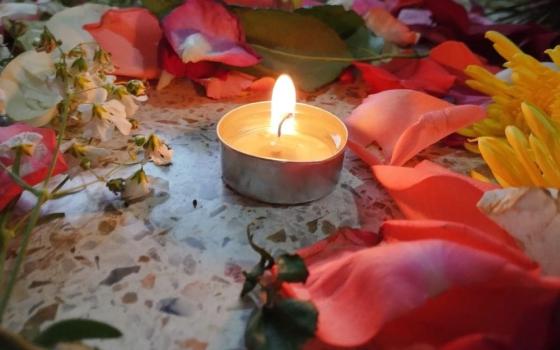
Our experiences shape us, weave an identity for us that in many ways is not anticipated. (Unsplash/Erik Mclean)

(GSR logo/Toni-Ann Ortiz)
Our 2021-22 panel for The Life is coming to an end. For both the August and September issues of The Life, we asked all of our panelists the same question: Why do you stay in religious life? What gives you hope?
The responses are so profound, we divided the panel even further, into four different sets of responses. This is Part 3. Read Part 1 and Part 2.
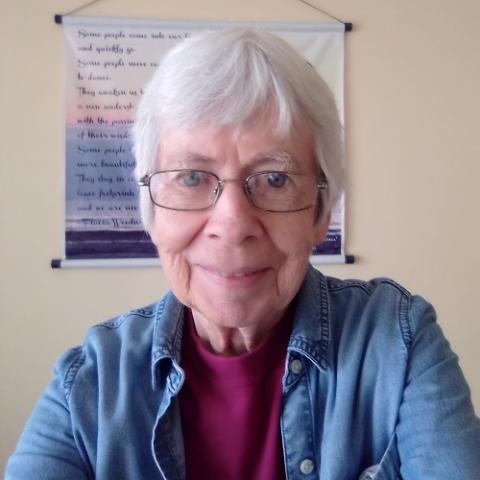
Sue Scharfenberger is an Ursuline Sister from Louisville, Kentucky. An educator, she ministered in rural Mississippi and for the last 42 years has been with the people in the coastal region and the Central Sierra of Peru. Her ministry has been with circles and communities of women around issues of empowerment, nonviolence and leadership. She has served as facilitator for various religious communities in Central and South America and the Caribbean and currently represents her congregation as mission promoter with parents and teachers at Santa Angela Merici School, founded by the Ursuline Sisters of Louisville in 1965 in Carmen de la Legua, Peru.
Many young people today have lots of possibilities for service experiences, volunteering in any number of organizations and institutions. However, that was not the case for me in the '50s. There were not a lot of opportunities, but I grabbed at the few that there were. And those early experiences wove in me a fabric that has not lost its interconnections of threads.
Because of some physical limitations, my dad was spared from military service of any kind. But from him, I learned the importance and value of peace-making. Nothing about war has ever made any sense to me, but I was always moved by the men and women who volunteered, not to fight but to heal the wounds of those who returned from battle badly scarred emotionally or physically.
My mom volunteered in a number of church or school organizations. There was a sense of being involved in what was for the common good that took priority in her life — and in that of our family.
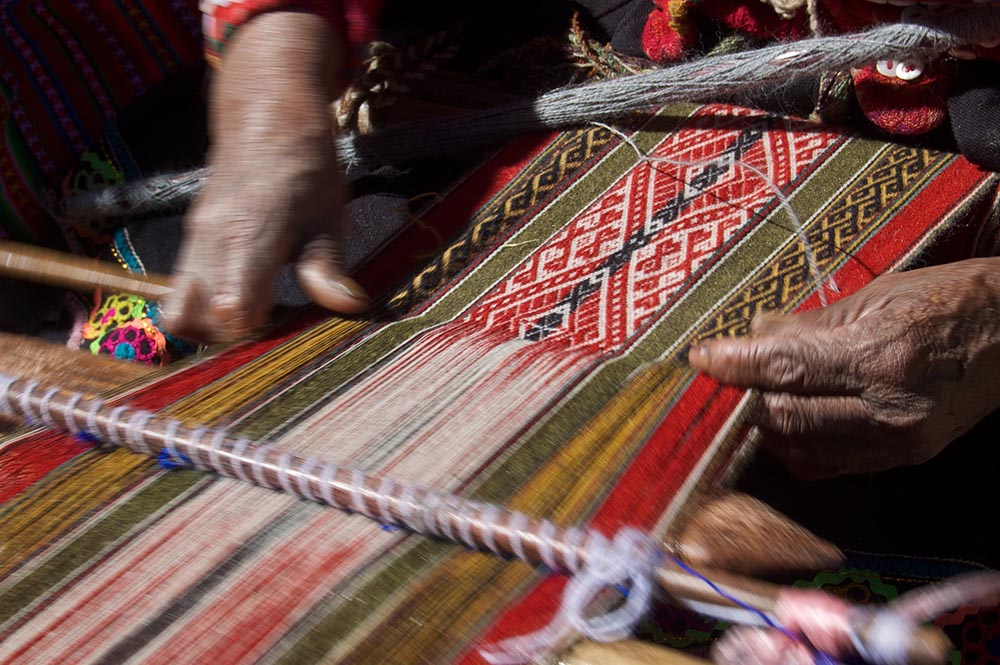
A Quechua woman near Cuzco, Peru, weaves llama yarn. (Flickr/Ken Bosma)
So peace-making, service, the common good, reaching out to those whose needs are greatest, repairing injustices, creating systems of equality all became threads in the fabric of who I am. And for me, religious life — and, more particularly, Ursuline religious life — became the fabric that sustained who I was becoming. Our experiences shape us, weave an identity for us that in many ways is not anticipated. This evolving process of becoming and living faithfully to an inner discernment is always challenging, sometimes surprising, and never without hills to climb.
Relationships within and beyond religious life helped to carefully choose the threads that would then sustain the tensions in the process of weaving. Some parts of the fabric had to be undone and rewoven. Maybe tighter. Maybe looser. Learning from the weavers in the Andes of Peru was a great gift, and having a wise woman weaver as friend was more than a blessing.
Circles of weavers are places of empowerment. Some become weavers of dreams, of potential, of possibility, of struggle, of mutual support and caring. But I have yet to come across a circle of weavers (really or figuratively) that does not offer hope for families, for women, for children and for youth. And, quite honestly, I believe these circles of weavers are weaving new forms of mission and ministry, new models for peace-making and justice-building, new spaces for equality and inclusion.
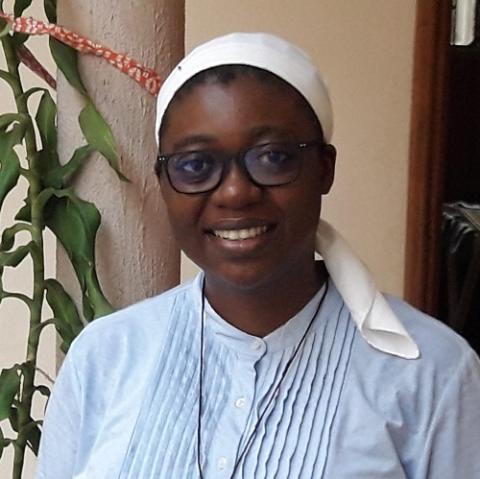
Elise Solange Maga is a Sister of the Divine Will in Cameroon. With an academic background in bilingual letters, pastoral theology for religious, and secondary education, she also earned diplomas in formation and vocational animation in Rome. She has had a variety of pastoral experiences and worked in justice/peace ministry with Caritas, and with children and young people, widows, the sick, and young people in vocational discernment. Currently, she teaches languages and religious studies at a bilingual college in Cameroon. She is also a parish catechist, animates the meetings of living ecclesial communities, and accompanies youth.
In a recent letter from a former student, I read: "Dearest teacher, I thank you earnestly for standing by me during the good and hard times. I wish to let you know how much I'll miss all your teachings; everyone needs a good person, and it isn't surprising that you are leaving us, because everyone needs a bit of you and it will be selfish on our part to keep you all to ourselves."
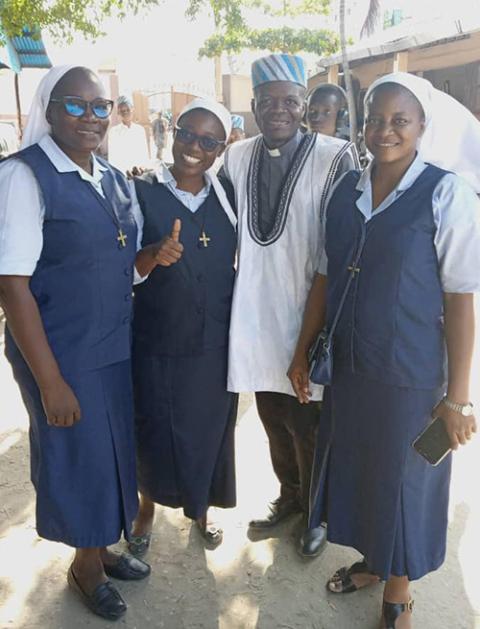
Sr. Elise Solange Maga (second from left) with two of her fellow Sisters of the Divine Will and a newly ordained Jesuit priest, at the celebration after his Thanksgiving Mass (Courtesy of Elise Solange Maga)
This expression of gratitude summarized my mission and reminded me that the Lord of the harvest uses me as his instrument and wants to provide little joys, love and consolation. It invited me to contemplate God's initiative, the call that echoed in my tender age to be with Jesus and share his mission: a desire, a dream nurtured, finally answered with a generous heart.
Every stage of my life on the path of discipleship has guided me to a door that discloses a new call. After 11 years, I realize that my primary call is to remain at "school," at the master's feet, to learn to conform my life to his. In this Spirit-led adventure, there have been moments of darkness, and the path is steep, but he tells me: "My grace is sufficient for you" (2 Corinthians 12:9). He is the "rock" in whose faithfulness I trust.
The path is endless and full of surprises; at each step, I've been able to discover the truth about myself — limits and gifts — which cleared my illusions. My real identity confirms the fact that nothing depends on my strength. I am an earthenware pot in need of grace.
I am not always aware of the impact that a smile, a lesson, an encouragement, nearness, a handshake can have. The little actions I sow sometimes bear more fruits than I expect.
I stay because I have decided to invest in what does not expire: being a "sister and mother" (Matthew 12:50), generating life. My relationship with God in the contemplation of his word sustains my action, opens me to my fellow brothers and sisters in humanity. Each new day, I strive to say with Isaiah, "Here I am, Lord. Send me."
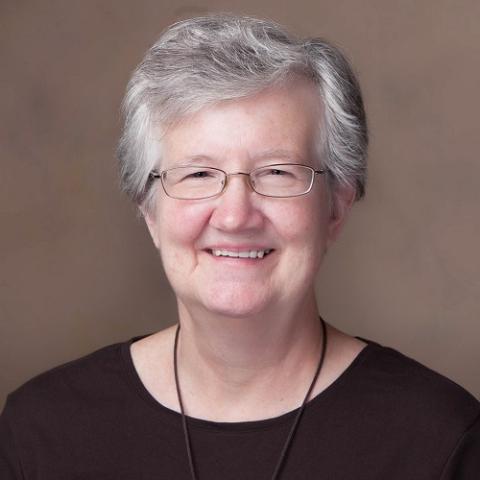
Maryann Agnes Mueller is a Felician Sister of North America. Before her entrance into the congregation, she worked as a dietician and research tech in cholesterol metabolism. Later, she worked as a certified diabetes educator and taught science in high school. Now, she serves as the full-time justice and peace coordinator for the Felician Sisters of North America in Enfield, Connecticut, and edits the congregational justice and peace newsletter. She serves on several boards; among them is U.S. Catholic Sisters Against Human Trafficking, for whom she publishes the Stop Trafficking Newsletter.
When I was in my first year in community, I came across this quote from Dorothy Day: "You will know your vocation by the joy that it brings you. You will know. You will know when it's right." There have been many times in the past 27 years of living in a religious community that I knew with a sense of peace and truth that I was exactly where God wanted me to be, doing exactly what God wanted me to do.

Our God who is calling me forward, our God who is walking beside me and in the current day's activities, is present even more than I am. (Unsplash/Todd Trapani)
I daily try to be intentional in seeking and pursuing the God quest, living each day doing what God wants me to do — nothing more and nothing less. There have been many times during the years when I know what I just did I did not do on my own and that God took over.
Christ is the most intimate relationship in my life, comfortable most days, but there are also times when I know God is stretching me beyond my comfort zones. Each day, when I put on my Felician cross, I say yes to that day's call to listen and respond.
This yes is a reminder of the one for whom I do what I do: Our God who is calling me forward, our God who is walking beside me and in the current day's activities, is present even more than I am.
I am hopeful that religious life will always exist as yeast in our society and world, an essential agent for growth and evolution into the kingdom of God on Earth. I am blessed to have spent most of my years in religious life working with other religious women and men, nationally and globally, to transform unjust structures.
As contemplative activists with an eye on our God who is forever coming anew and calling us forward, I find that women and men religious collaboratively and intentionally seek out and build systems that uphold inclusiveness, peace and justice. The sense of rightness when religious women and men take a stance for justice, mercy, inclusion and peace is, for me, a sign that religious life is taking another step into the evolving kingdom of God on Earth.
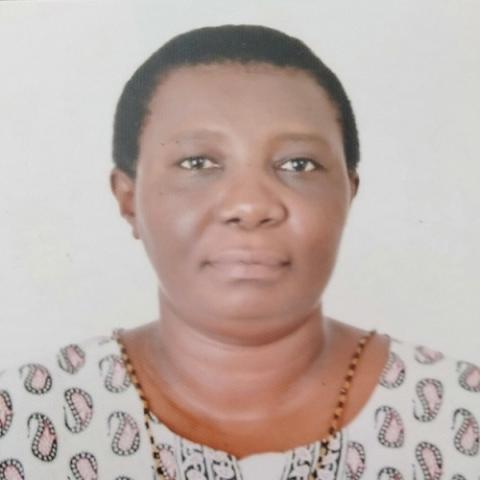
Catherine Scholastica K. Mutua is a Religious of Notre Dame of the Missions from Kenya. Her academic background was in theology and religious studies, peace and development, with certification in early childhood and Scripture. Her first ministries were in teaching nursery school and coordinating the oblates. Recently, she returned from the Philippines, where she had been living and working for 21 years, primarily involved in peace-building and development programs. She hopes to continue similar programs in the Machakos Diocese in Kenya.
When I read this question, I thought of a priest with whom I was working. He was giving us a talk, and he began by saying: "When I see what is going on in our church, I feel so sad and disappointed. However, this is the same church I said yes to, and I will still stay in the same church despite all the scandals we are seeing and witnessing. I'm sure the God who called us and placed us in his church will see to it that we continue to live our calling, and God will cleanse it and perfect us for his mission."
Those were beautiful and somewhat serious words to be spoken by a young priest. It made me reflect on my own commitment to religious life and what all that means. I started asking myself what I see around me and even experience: Does it make me question the kind of life I have chosen? I think it should because I cannot just stay blind to what is happening around me and assume all is well. Is staying in religious life relevant for me today?
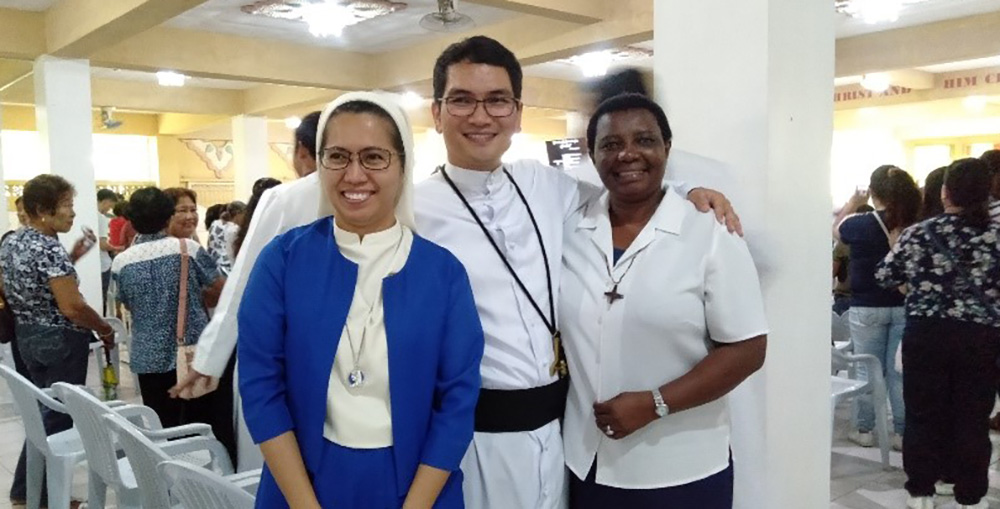
Sr. Schola Mutua (right), a Religious of Notre Dame of the Missions, with an Oblate of Notre Dame sister and a priest of Oblate of Mary Immaculate, during the first profession of some Oblate of Mary Immaculate brothers (Courtesy of Catherine Scholastica K. Mutua)
The answer for me is yes, and a yes with a lot of reflection and awareness if I continue to be relevant as a religious today.
What gives me hope is that the life I have chosen to live is bigger than I am. The mission I undertake is the mission of Christ, and he will see to its completion. I'm only an agent of the mission, and my saying yes to be part of the mission adds the flavor to my different activities.
I can resonate with the words of Bishop Ken Untener's "Romero Prayer": "Nothing we do is complete, which is another way of saying that the kingdom always lies beyond us." I have the assurance that God is bigger than the tiny things I do. However small they might be, they add to the bigger picture, and God gives me the strength to do what I'm called to do.
So I stay in religious life because God in his wholeness is the ultimate, and I don't need to worry about anything.
I continue to stay and multiply God's goodness on Earth through the contributions I make. I pray for the graces I need to be faithful to the end.
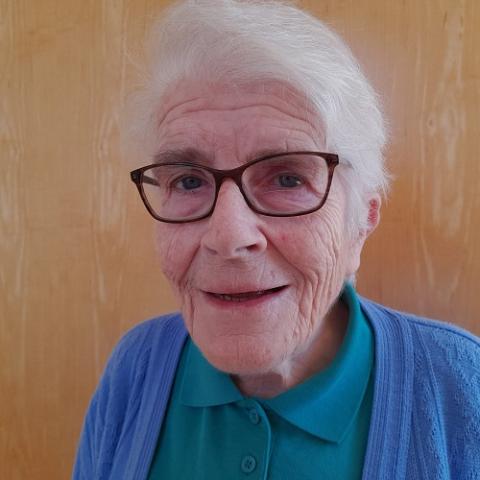
Eilis Weber is a member of the Medical Missionaries of Mary in Ireland. She ministered in Angola as a nurse/midwife and in nursing education. In Boston, she wrote newsletters and appeals to benefactors. She currently ministers at the motherhouse in Drogheda, Ireland, working with elderly sisters, staffing the switchboard, and writing for the congregational newsletter and other newspapers.
Those two questions perplexed me, as I remembered my teenage hopes and dreams and how the idea of becoming a religious frequently passed through my head. Initially, I ignored it, as I had more important "ambitions" in my mind.
I became a nurse, acquired my own car and a transistor radio — all luxury items in those days — then realized that I had reached the pinnacle of worldly possessions but suddenly felt empty. The nagging reminders of religious life persisted, becoming more insistent, until I decided at age 26 to give it a try to get it out of my system (and then to get on with my real life!).
Advertisement
In my missionary order's formative years, we learned we were following Christ in his healing mission by focusing on the health of needy people. We were called "to go in haste," as Mary did at the Visitation (Luke 1:39-56), and to care for people in places where the needs were greatest. All of this was grounded in our ever-developing relationship with our God of endless love and mercy.
I have done this to the best of my ability for the greater part of 55 years, called and challenged to work in a war-torn country, tending to huge numbers of wounded soldiers and civilians in our hospital, training girls and boys to be nurses and laboratory technicians, all where it was our privilege to bring hope and courage to a people suffering war fatigue and despair.
In all of this, the Lord has been present to us, strengthening us and guiding us in all our interactions.
Now in the autumn of my life, my community and I are to be a healing presence, a powerhouse of prayer, far removed from a war situation. We reach out to the many suffering people with whom we come in contact: refugees, people experiencing homelessness, asylum-seekers, victims of violence. For us, hospitality is a priority, touching those affected and welcoming them, both physically and by telephone. We are actually in the process of setting up an intercultural initiative to help in the inclusion of people of different backgrounds.
Recently, a couple who attended the funeral of one of our deceased sisters sent us a thank you for the warm welcome they had received and described our community as an "Isle of Tranquility."
With the Lord's help, I hope to continue to contribute at this level to our suffering neighbors.


